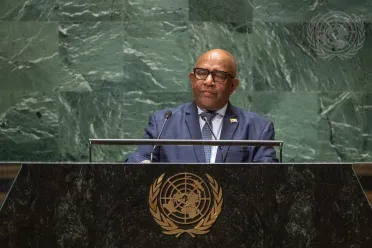Statement
Statement summary
AZALI ASSOUMANI, President of Comoros, said he wished to express — as Chairperson of the African Union — the voice of all African States, who believe in a fairer, more effective multilateralism that can help bring about a better life for the continent and the entire world. To accomplish this, an in-depth reform of the United Nations system is required, and Africa — where 3.8 billion people will live by the end of the century — has the right to be permanently represented on the Security Council in line with the Ezulwini Consensus. “It is a question of equity,” he stressed. He then turned to the numerous challenges Africa is facing, including widespread food insecurity despite the continent’s vast arable land and plentiful, competent labour. Climate change and numerous continental conflicts compound this situation — as does the Russian Federation-Ukraine war, which has brought in its wake disrupted grain and fertilizer supplies and unprecedented inflation.
Pointing out that Africa remains a major importer of agricultural goods — which contributes to a sizeable shortfall in trade balances — he underlined the need for partnerships between African Governments, development bodies and the private sector to effectively resolve this challenge in a lasting manner. Africa’s partners must also support the transfer of expertise and technology to promote agricultural development and produce goods locally — thus adding value and helping to combat shortages and famine. Further, there is a need to strengthen the fight against climate change, as the world’s people are living through frequent disasters that devastate economies, social infrastructure and agriculture. Beyond numerous human losses, he noted that the damage resulting from these catastrophes requires rebuilding, the cost of which “is not always something our countries can sustain”. He therefore called on the international community to promote communal approaches, structured to meet these disasters on a large scale, to provide people the support they need to recover.
He also called for strengthening the United Nations Human Settlements Programme (UN-HABITAT), along with a new urban agenda to better support African cities that are full of potential, but very vulnerable to climate change. Turning to the Sahel — seriously affected by terrorism since 2010 — he underlined the need for the international community to urgently work with African States to stabilize the region. He observed that, on this planet, “crises are very easily imported”. In addition to terrorism, Africa faces a resurgence of anti-constitutional changes that undermine democracy, peace, security, stability and socioeconomic development. For its part, the African Union has implemented sanctions against those responsible and has demanded a rapid return to constitutional order in the countries concerned. He underscored that “political life worthy of its name is not possible without respecting electoral timetables and legitimate institutional mechanisms, which undergird a democratic public life”.
He went on to spotlight the African Continental Free Trade Area, stating that he, as African Union Chairperson, will use this tool to create needed wealth and move towards industrialization so that Africa ceases to be “a simple provider of raw materials”. This common market will also stimulate technology transfer and promote investment in a market of more than 1 billion people. He also recalled the “Comorian nature of the Île de Mayotte”, spotlighting a dialogue with France to find a solution to this dispute in the interests of both countries. Detailing past peaceful transitions of power in his country, he said that Comoros, on 26 May 2024, will once again “celebrate the political maturity” of its people as the inauguration of its next President will “symbolize the deep-rootedness and strength of our democracy”.
Full statement
Read the full statement, in PDF format.
Photo

Previous sessions
Access the statements from previous sessions.
